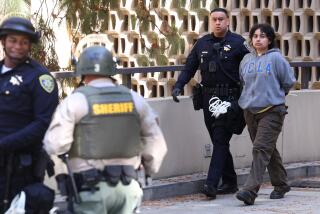GALLERY : Cadet Blues
- Share via
HUNTINGTON BEACH — Following an intense hour in the classroom at Golden West College, the students, all in uniform, marched outside for a break.
Some break. The students lay prone on the blacktop outside. They then began a series of pushups, chanting in military cadence.
“This is quite an arduous program,” commented one of the instructors, Orange Police Sgt. Steve Ames.
The young men and women in this unusual class are in training to be police officers. Specifically, they are taking 24 weeks of instruction to learn community policing.
The community college’s 33-year-old police-training program now emphasizes turning out graduates who can deal with culturally diverse neighborhoods and an array of community problems. Students are instructed in “sensitivity awareness” and “underlying causes of crime.”
Last year, Golden West College’s Criminal Justice Training Center won an educational award for its new community-policing program, launched in 1993.
For the students, mostly in their 20s or 30s, community policing is not just an educational buzz term. The future police officers said they see the new training as important and realistic.
Susan Winslow, 21, said community policing involves “how we deal with people on the street.” She added, “It means working closer with the community and learning how to solve problems together, rather than just coming in and taking care of (one aspect of) a problem and then leaving it.” Winslow has been hired by the Orange Police Department and will assume her duties there after graduating from Golden West’s training program in March.
Matthew Groff, 32, of Placentia, does not yet have a police job. A former naval helicopter pilot, he said he hopes to land a job with a department that has helicopters.
Groff said community policing “basically means you’re a problem solver.” He said students learn how to reach out to people in neighborhoods. “Instead of just turning away and saying, ‘Sorry, all I do is enforce the law,’ you want to have the opportunity to help.”
Student Joe Sampson, 34, said community policing means “being helpful.” Sampson, a former high school teacher, has been hired by the Orange Police Department.
Sampson added, “It involves getting different community organizations active with the police so that you have a liaison with the people you serve. And that’s important, not only for the police image, but also to give the public the confidence to know that you’re out there so they can be safe.”
Golden West instructors are police officers from several O.C. cities who teach as a second job.
Ames, of the Orange police, graduated from Golden West’s program in 1979. He said the emphasis on community policing has made the program even better.
“I think the graduates of this program are going to be better equipped, not only for their own safety, but also in how to interact with the community,” Ames said.
Students must be in excellent physical condition. Impromptu sessions of pushups are not uncommon. The students, who wear uniforms to class, also have morning inspections. They march to and from classes and have intense weapons training and strength exercises.
“We do more than enforce the law,” Groff said. “We’re public servants. We help the people.”
More to Read
Sign up for Essential California
The most important California stories and recommendations in your inbox every morning.
You may occasionally receive promotional content from the Los Angeles Times.













